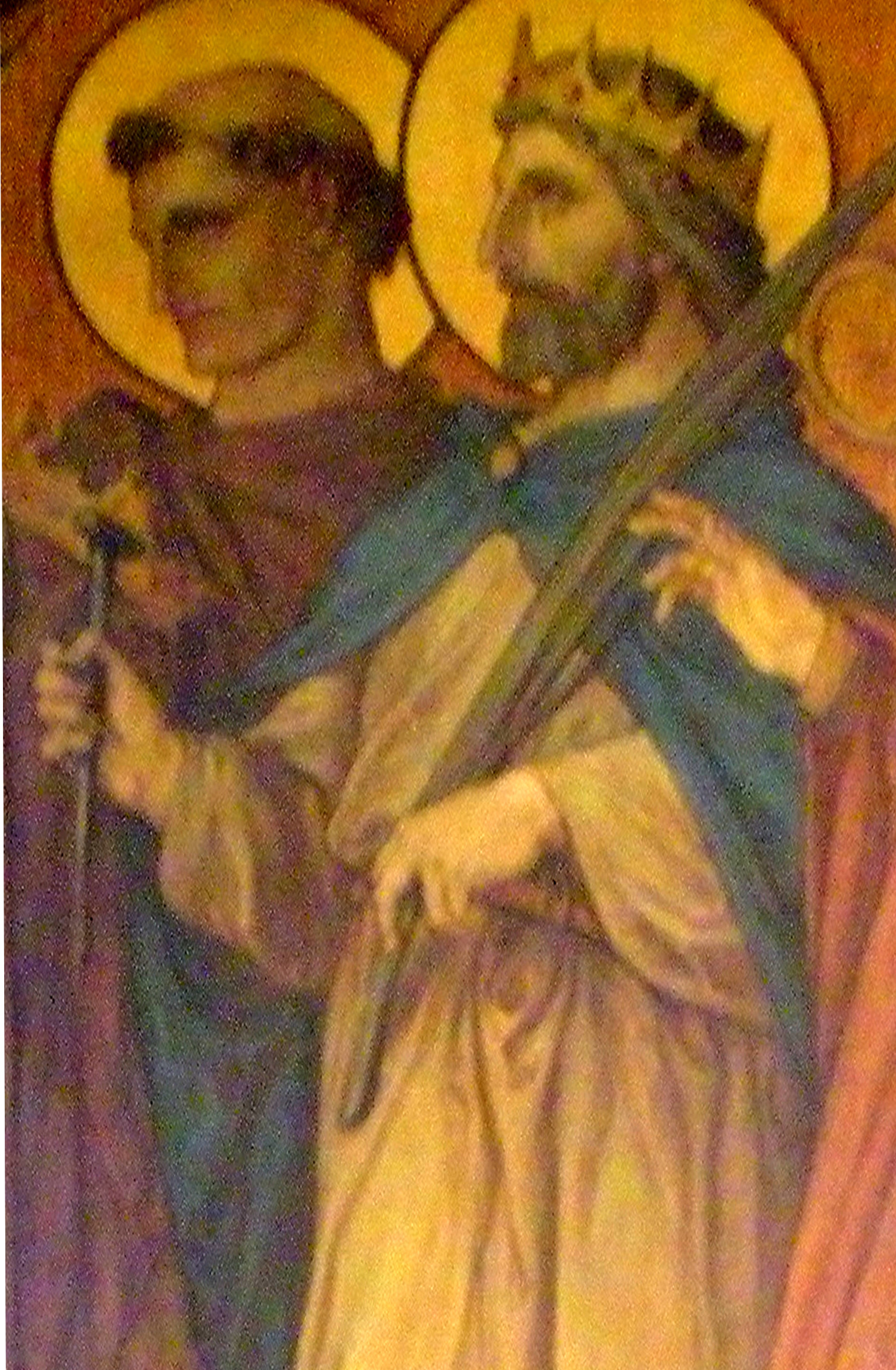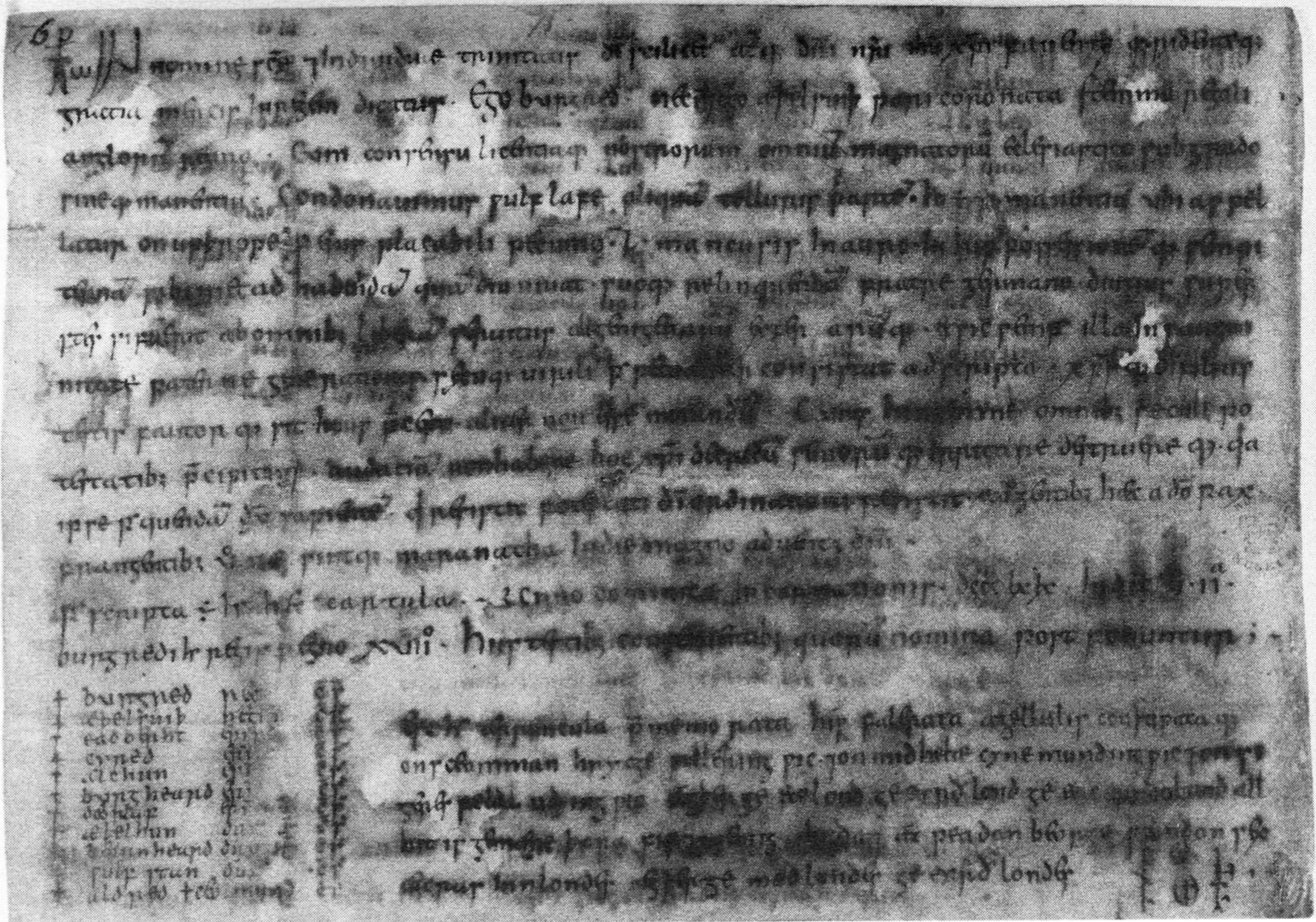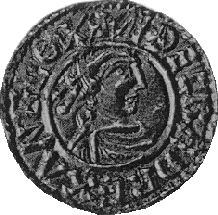|
874
__FORCETOC__ Year 874 ( DCCCLXXIV) was a common year starting on Friday of the Julian calendar. Events By place Europe * Salomon, duke ('king') of Brittany, is murdered by a faction which includes his son-in-law Pascweten and Gurvand, son-in-law of late ruler Erispoe. After Salomon's death they divide the country, and Pascweten and Gurvand co-rule Brittany. * Svatopluk I, ruler (''knyaz'') of Great Moravia, concludes a peace treaty at Forchheim (Northern Bavaria). He is able to expand his territories outside the Frankish sphere, and subjugates the Vistulans. * Ingólfr Arnarson arrives from Norway, as the first permanent Viking settler in Iceland. He builds his homestead and founds Reykjavík. The settlement of Iceland begins (approximate date). Britain * The Danish Vikings (from their base at Repton) drive King Burgred of Mercia into exile, and sack Tamworth. They conquer his kingdom and install his political opponent, Ceolwulf II, as sub-king. * Autumn – ... [...More Info...] [...Related Items...] OR: [Wikipedia] [Google] [Baidu] [Amazon] |
Ceolwulf II Of Mercia
Ceolwulf II (died c. 879) was the last king of independent Mercia. He succeeded Burgred of Mercia who was deposed by the Vikings in 874. His reign is generally dated 874 to 879 based on a Mercian regnal list which gives him a reign of five years. However, D. P. Kirby argues that he probably reigned into the early 880s. By 883, he was replaced by Æthelred, Lord of the Mercians, who became ruler of Mercia with the support of Alfred the Great, king of Wessex.Miller, Ceolwulf II Dynastic background On anthroponymic grounds, Ceolwulf is thought to belong to the ''C'' dynasty of Mercian kings, a family which claimed descent from Pybba of Mercia. The ''C'' dynasty, beginning with Coenwulf, may have had ties to the ruling family of Hwicce in south-west Mercia. Ceolwulf's immediate ancestry is unknown, but he is thought to be a descendant of Ceolwulf I through his daughter Ælfflæd. Ælfflæd was first married to Wigmund, son of King Wiglaf, and then to Beorhtfrith, son of King ... [...More Info...] [...Related Items...] OR: [Wikipedia] [Google] [Baidu] [Amazon] |
Salomon, King Of Brittany
Salomon () (died 874) was count of Rennes and Nantes from 852 and duke of Brittany from 857 until his assassination in 874. In 867, he was granted the counties of Avranches and Coutances, and he used the title king of Brittany intermittently after 868. In popular tradition within Brittany he was canonised as "Saint Salomon" after his death and raised to the rank of martyr. Rise under Erispoe Salomon was the son of Riwallon III of Poher, who himself was the son of Count Erispoë I of Poher, King of the Browaroch (775–812), and older brother of Nominoe. In 851, Charles the Bald, after his defeat at the Battle of Jengland, made peace with Salomon's cousin Erispoe, son of Nominoe, and granted him the counties of Rennes and Nantes and the Pays de Retz in Poitou as far as the river Mayenne. In 852, Salomon swore an oath to Charles and became his loyal follower (''fidelis''); in return, in a manner similar to Erispoe, he was granted Rennes, Nantes, and Retz as a "third" of B ... [...More Info...] [...Related Items...] OR: [Wikipedia] [Google] [Baidu] [Amazon] |
Ubba
Ubba (Old Norse: ''Ubbi''; died 878) was a 9th-century Viking and one of the commanders of the Great Heathen Army that invaded Anglo-Saxon England in the 860s. The Great Army appears to have been a coalition of warbands drawn from Scandinavia, Ireland, the Irish Sea region and Continental Europe. There is reason to suspect that a proportion of the Viking forces specifically originated in Frisia, where some Viking commanders are known to have held fiefdoms on behalf of the Franks. Some sources describe Ubba as ' of the Frisians, which could be evidence that he also associated with a Frisian benefice. In 865, the Great Army, apparently led by Ivar the Boneless, overwintered in the Kingdom of East Anglia, before invading and destroying the Kingdom of Northumbria. In 869, having been bought off by the Mercians, the Vikings conquered the Kingdom of East Anglia, East Angles, and in the process killed their king, Edmund the Martyr, Edmund, a man who was later regarded as a saint and Ch ... [...More Info...] [...Related Items...] OR: [Wikipedia] [Google] [Baidu] [Amazon] |
Burgred Of Mercia
Burgred (also Burhred or Burghred; Old English: ''Burhræd'') was an Anglo-Saxon king of Mercia from 852 to 874. Family Burgred became king of Mercia in 852, and may have been related to his predecessor Beorhtwulf. After Easter in 853, Burgred married Æthelswith, daughter of Æthelwulf, king of the West Saxons. The marriage was celebrated at the royal villa of Chippenham in Wessex. Life In 853 Burgred sent messengers to Æthelwulf, king of the West Saxons, seeking his help to subjugate the Welsh, who lived between Mercia and the western sea, as they were rebelling against his rule. Immediately King Æthelwulf advanced with Burgred against the Welsh, and successfully repressed the rebellion. Twelve years after Burgred's success against the Welsh, in 865, the Great Heathen Army arrived. Following its successful campaigns against East Anglia and Northumbria it advanced through Mercia, arriving in Nottingham in 867. Burgred then appealed to his brothers-in-law King Æthelr ... [...More Info...] [...Related Items...] OR: [Wikipedia] [Google] [Baidu] [Amazon] |
Gurvand
Wrhwant, Gurwant, Gurwent or Gurvand () (died 876) was a claimant to the Kingdom of Brittany from 874 until his death in opposition to Pascweten, Count of Vannes. Wrhwant was complicit in the conspiracy which assassinated Salomon in 874. However, he was of the faction which had been outside Salomon's court and he hailed from northwest Brittany. He was, however, never styled "Count". He mustered 200 men to fight the Vikings in 874.Smith, 30 and n86. After Salomon's death, he and Pascweten divided the country between them, though Regino of Prüm records that the latter received a larger share. The two soon fell out and fought over the succession. He had died by the middle of 876 and his son Judicael had taken up his role. His wife was a daughter of Erispoe, and in some reconstructed genealogies their one daughter was married to Berengar of Rennes. * unknown daughter, married to Berengar of Rennes, Count of Rennes, whose son and successor, according to one popular solution, w ... [...More Info...] [...Related Items...] OR: [Wikipedia] [Google] [Baidu] [Amazon] |
Iceland
Iceland is a Nordic countries, Nordic island country between the Atlantic Ocean, North Atlantic and Arctic Oceans, on the Mid-Atlantic Ridge between North America and Europe. It is culturally and politically linked with Europe and is the region's westernmost and most list of countries and dependencies by population density, sparsely populated country. Its Capital city, capital and largest city is Reykjavík, which is home to about 36% of the country's roughly 380,000 residents (excluding nearby towns/suburbs, which are separate municipalities). The official language of the country is Icelandic language, Icelandic. Iceland is on a rift between Plate tectonics, tectonic plates, and its geologic activity includes geysers and frequent Types of volcanic eruptions, volcanic eruptions. The interior consists of a volcanic plateau with sand and lava fields, mountains and glaciers, and many Glacial stream, glacial rivers flow to the sea through the Upland and lowland, lowlands. Iceland i ... [...More Info...] [...Related Items...] OR: [Wikipedia] [Google] [Baidu] [Amazon] |
Great Heathen Army
The Great Heathen Army, also known as the Viking Great Army,Hadley. "The Winter Camp of the Viking Great Army, AD 872–3, Torksey, Lincolnshire", ''Antiquaries Journal''. 96, pp. 23–67 was a coalition of Scandinavian warriors who invaded England in 865 AD. Since the late 8th century, the Vikings had been engaging in raids on centres of wealth, such as monasteries. The Great Heathen Army was much larger and aimed to conquer and occupy the four kingdoms of East Anglia, Northumbria, Mercia and Wessex. The name ''Great Heathen Army'' is derived from the '' Anglo-Saxon Chronicle''. The force was led by three of the five sons of the semi-legendary Ragnar Lodbrok, including Halfdan Ragnarsson, Ivar the Boneless and Ubba. The campaign of invasion and conquest against the Anglo-Saxon kingdoms lasted 14 years. Surviving sources give no firm indication of its numbers, but it was described as amongst the largest forces of its kind. The invaders initially landed in East Ang ... [...More Info...] [...Related Items...] OR: [Wikipedia] [Google] [Baidu] [Amazon] |
Vikings
Vikings were seafaring people originally from Scandinavia (present-day Denmark, Norway, and Sweden), who from the late 8th to the late 11th centuries raided, pirated, traded, and settled throughout parts of Europe.Roesdahl, pp. 9–22. They also voyaged as far as the Mediterranean Sea, Mediterranean, North Africa, the Middle East, Greenland, and Vinland (present-day Newfoundland in Canada, North America). In their countries of origin, and some of the countries they raided and settled in, this period is popularly known as the Viking Age, and the term "Viking" also commonly includes the inhabitants of the Scandinavian homelands as a whole. The Vikings had a profound impact on the Early Middle Ages, early medieval history of Northern Europe, northern and Eastern Europe, including the political and social development of England (and the English language) and parts of France, and established the embryo of Russia in Kievan Rus'. Expert sailors and navigators of their cha ... [...More Info...] [...Related Items...] OR: [Wikipedia] [Google] [Baidu] [Amazon] |
Settlement Of Iceland
The settlement of Iceland ( ) is generally believed to have begun in the second half of the ninth century, when Norsemen, Norse settlers migrated across the North Atlantic. The reasons for the migration are uncertain: later in the Middle Ages Icelanders themselves tended to cite civil strife brought about by the ambitions of the Norway, Norwegian king Harald I of Norway, but modern historians focus on deeper factors, such as a shortage of arable land in Scandinavia. Unlike Great Britain and Ireland, Iceland was unsettled land and could be claimed without conflict with existing inhabitants. On the basis of by Ari Þorgilsson, and , histories dating from the twelfth and thirteenth centuries and providing a wealth of detail about the settlement, the years 870 and 874 have traditionally been considered the first years of settlement. However, these sources are largely unreliable in the details they provide about the settlement, and recent research focuses more heavily on archaeological ... [...More Info...] [...Related Items...] OR: [Wikipedia] [Google] [Baidu] [Amazon] |
Ingólfr Arnarson
Ingolfr Arnarson, in some sources named Bjǫrnolfsson, ( – ) is commonly recognized as the first permanent Norse settler of Iceland, together with his wife Hallveig Fróðadóttir and foster brother Hjǫrleifr Hróðmarsson. According to tradition, they settled in Reykjavík in 874. Biography Ingolfr Arnarson was from the valley of Rivedal in Sunnfjord in western Norway. According to the Icelandic Book of Settlements, he built his homestead in and gave name to Reykjavík in 874. However, archaeological finds in Iceland suggest settlement may have started somewhat earlier. The medieval chronicler Ari Þorgilsson said Ingolfr was the first Nordic settler in Iceland, but mentioned that Irish monks had been in the country before the Norsemen. He wrote that they left because they did not want to live among the newly arrived Norse pagans. The Book of Settlements (written two to three centuries after the settlement) contains a story about Ingolfr's arrival. The book claims ... [...More Info...] [...Related Items...] OR: [Wikipedia] [Google] [Baidu] [Amazon] |
Kingdom Of Northumbria
Northumbria () was an early medieval Heptarchy, kingdom in what is now Northern England and Scottish Lowlands, South Scotland. The name derives from the Old English meaning "the people or province north of the Humber", as opposed to the Southumbria, people south of the Humber, Humber Estuary. What was to become Northumbria started as two kingdoms, Deira in the south and Bernicia in the north. Conflict in the first half of the seventh century ended with the murder of the last king of Deira in 651, and Northumbria was thereafter unified under Bernician kings. At its height, the kingdom extended from the Humber, Peak District and the River Mersey on the south to the Firth of Forth on the north. Northumbria ceased to be an independent kingdom in the mid-tenth century when Deira was conquered by the Danelaw, Danes and formed into the Kingdom of York. The rump Earl of Northumbria, Earldom of Bamburgh maintained control of Bernicia for a period of time; however, the area north of R ... [...More Info...] [...Related Items...] OR: [Wikipedia] [Google] [Baidu] [Amazon] |
Pascweten
Pascweten (died 876) was the count of Vannes and a claimant to the Duchy of Brittany, rule of Brittany. He was a son of Ridoredh of Vannes, a prominent and wealthy aristocrat first associated with the court of Erispoe in the 850s. He owned vast landed estates and salt works (as at Guérande) in southeastern Brittany and was a patron of Redon Abbey. Pascweten was a son-in-law of Salomon, Duke of Brittany, in August 867, when he negotiated a lasting peace at Compiègne with Charles the Bald on behalf of his father-in-law and prevented the king from marching on Brittany. Pascweten swore an oath of fidelity to Charles on Salomon's behalf. In 874 Pascweten, Gurvand, Duke of Brittany, Wrhwant, and Wigo, son of Riwallon, Count of Cornouaille, conspired against Salomon and assassinated him, but since each hailed from a different regional party, they soon found themselves at odds with Salomon gone. Pascweten and Wrhwant fought over the succession to Breton rule for the next two years. Th ... [...More Info...] [...Related Items...] OR: [Wikipedia] [Google] [Baidu] [Amazon] |






